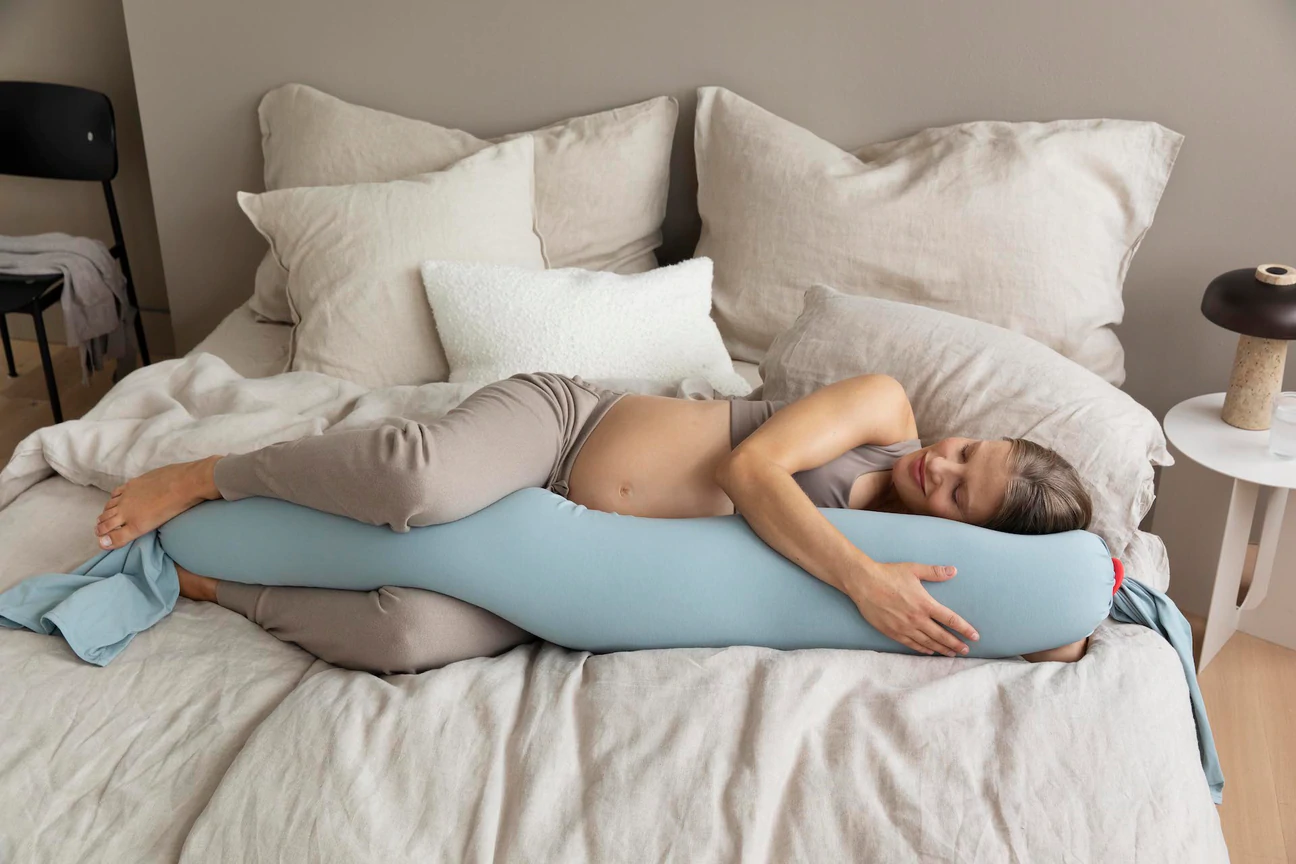Trying to get a good night’s sleep in the second and third trimesters of pregnancy is a challenge faced by most pregnant women.
Feeling too hot, too cold, experiencing heartburn, needing the loo, trying to get into a comfortable position and processing the many reeling thoughts that might be going through your head as you approach your baby’s arrival are all reasons why you might be struggling to get some shut eye.
In this article, we’ll cover your most searched for questions about pregnancy and sleep, including:
- What is the best position to sleep in when pregnant?
- What happens if I wake up on my back or in a different position to the one I went to sleep in?
- How much sleep do I need in pregnancy?
- What should I wear to bed during pregnancy?
- How can I get a better night’s sleep when pregnant?
If you’re pregnant and desperate to get a better night’s sleep, you’ve come to the right place!
What is the best position to sleep in when pregnant?
The most comfortable sleep position for you may not be the safest sleep position for your baby, so it’s important to follow the recommended advice about safe sleep during pregnancy, especially in the third trimester.
Research suggests that sleeping on your back after 28 weeks can increase your risk of stillbirth, and sleeping on your left side is one way to reduce this risk.
Experts aren’t entirely sure what causes the link between sleeping on your back and an increased risk of stillbirth, but they believe it’s to do with the additional pressure on the blood vessels that supply the uterus, as this can restrict blood flow and oxygen.
You may also find this position uncomfortable in late pregnancy too, as the extra weight of the baby and your womb puts additional pressure on the other organs in your body.
The likelihood of stillbirth is very low for most women, but sleeping on your side will reduce your risk even further. Sleeping on your left side as opposed to your right also has the added benefit of improving circulation to the heart and encouraging blood flow to the baby, the uterus, and kidneys.
What happens if I wake up on my back or in a different position to the one I went to sleep in?
It is not always possible to stay in one position throughout the night, and often we aren’t in control of how we move when we’re asleep.
But if, in your third trimester, you find yourself on your back, front or right hand side when you wake up in the night, don’t worry – just reposition yourself on the left and try to go back to sleep.
What can help me stay asleep on my side?
There are a few things you can do to help you stay asleep on your side throughout the night. Here are some helpful tips:
- If you have long hair, try wearing it in a low bun on the back of your head so that it feels uncomfortable to lie on.
- Invest in a sleep pillow to help you remain in a comfortable side position. Members of our bloss team have tried and tested the BBHugMe and love it for its 5 point support system and the fact the firmness can be adjusted to suit your changing body. It really helped with back and pelvic girdle pain, which was getting in the way of precious sleep!

- If you don’t have a pregnancy pillow, try stacking ordinary pillows behind your back to prevent you rolling over in the night.
- If you have a partner, ask him or her to give you a gentle nudge in the night and correct your position if they see you have moved from your side.
What should I wear to bed during pregnancy?
There’s no right or wrong clothing to wear in bed during pregnancy – you can choose whatever feels comfortable.
Depending on the season in your third trimester, you might feel cold at night and want cosy socks and long pyjamas. If your third trimester falls in the Summer, you might decide to wear nothing at all!
However, to optimise comfort, you might consider the following:
- Cotton clothing to maximise breathability and avoid getting too sweaty.
- A non-wired maternity or nursing bra if you find that the increased size of your breasts is making it difficult to get comfy.
- A maternity belt or band to offer your bump a little more support in the night.
- Loose, cosy socks if your feet are cold.
- If you’re planning to breastfeed, you might want to invest in some button up maternity pyjamas or a button fronted night dress. These can be worn post-partum and will make feeding that little bit more accessible.
How much sleep do I need during pregnancy?
It’s normal to feel completely exhausted in the first 12 weeks of pregnancy. And it’s no wonder – growing a baby is hard work! You may find that you need a nap in the middle of the day, or want to go to bed much earlier than usual.
Hormonal changes can make you feel tired, nauseous and emotional so getting extra sleep may help you cope with these changes.
Later in your pregnancy, you may feel more tired because of the additional weight and difficulties sleeping. For this reason, it’s a good idea to catch up on sleep in the early weeks while you can!
The research is mixed about what counts as ‘excessive sleep’ during pregnancy but the Sleep Foundation recommends between 7-9 hours for most adult women.
If you’re getting significantly more or less sleep than this and you feel that it is affecting you, it would be wise to talk to your doctor or midwife about how they can help.

Tips for getting a good night’s sleep
It can be really frustrating when you’re struggling to sleep and just can’t manage it for whatever reason. Unfortunately, this is a very common problem. According to the Sleep Foundation, pregnancy insomnia affects more than 50% of pregnant women at some point during their pregnancy.
“Insomnia is a sleep disorder that makes it hard to drift off to sleep or to stay asleep through the night. Most people experience it by waking up early or not being able to get back to sleep,” says bloss hypnotherapist, Emma Norris.
“Whether your insomnia or disturbed sleep is related to anxiety, crazy dreams, frequent visits to the loo, or baby giving you a few swift kicks, getting enough sleep is vital to keeping you healthy.”
Along with Women’s Health Expert, Justine Hankin, we’ve compiled a list of 10 top tips to help reduce your chances of pregnancy insomnia and encourage you to get a better night’s sleep in your second and third trimesters.
1. Avoid screens after 8pm – or at least 2 hours before you go to bed. The blue light from these devices prevents the production of melatonin, which is needed to help you fall asleep.

2. Empty your bladder before bed! There’s nothing worse than lying in bed and trying to decide if you need a wee! Take this out of the equation by making sure you go to the toilet as the very last thing you do before getting into bed.
3. Make sure your bedroom is completely dark. That means switching off or covering anything with a charging light – such as an alarm clock, TV or electric toothbrush.
4. Have a warm bath before bed. Whilst a hot bath in pregnancy is not recommended due to the risk of getting overheated, a warm bath of around 37 degrees before bed can be super relaxing. Try lighting some candles and listening to gentle music or pregnancy affirmations to help you feel sleepy before bed.
5. Avoid drinking or eating anything containing caffeine after 2pm. Most women avoid these things in pregnancy anyway, but making sure you’re not consuming them close to bedtime will help ensure the caffeine isn’t keeping you awake. This includes chocolate too!
6. Not eating late at night will also reduce your symptoms of heartburn. Eating anything less than 2 hours before bedtime is likely to make indigestion and acid reflux worse, and that can be very uncomfortable when you’re lying in bed.
7. Listen to a guided meditation when you are about to go to sleep. There are a variety of guided meditations and hypnosis tracks available for purchase or free download on bloss. See below in our resources guide.
8. Add a few drops of lavender oil into a diffuser in your bedroom, or spray your pillow with a lavender mist. Lavender is well known for its sleep-inducing properties.
9. If you find yourself lying awake for long periods and the tossing and turning is making you miserable, get up. Do some tedious chores or walk around the house to try and tire yourself out.
10. Keep naps short. It’s a vicious cycle when you’ve had a bad night’s sleep – you want to catch up on sleep the following day, but long naps might prevent you from falling asleep at night. If you do need to nap in the day, keep it to no more than 30 minutes and as far away from bedtime as possible.
Sleep resources and tried and tested products to help you sleep better in pregnancy:
- Read Justine Hankin’s article about the importance of sleep for more of a deep dive into its significance for women’s overall health.
- Guided Pregnancy Relaxation by hypnobirthing specialist, Sam Meachin
- Pregnancy affirmations by hypnobirthing specialist, Faye Ceyhan
- Meditation awareness by Sophie Belle
- Hypnosis for Sleep by Charlie O’Brien
- Free initial hypnotherapy consultation with hypnotherapist and hypnobirthing specialist, Emma Norris
- BBHUGME Sleep pillow




Leave a Comment
You must be logged in to post a comment.